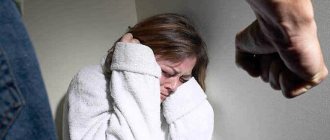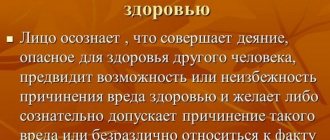What is serious harm to health
In medicine, harm to health is a violation of the integrity or function of organs and tissues under the influence of various environmental factors. Serious harm – life-threatening.
In part 1 of Art. 111 provides both a general concept of such harm and lists some specific injuries and illnesses that occurred as a result of criminal influence.
Of those listed in the article, the following will be considered serious harm to health:
- irreversible loss of the ability to hear, see, loss of an organ;
- mental disorder;
- diseases of drug addiction, substance abuse;
- permanent disfigurement of appearance;
- abortion;
- loss of professional ability to work in full;
- general working capacity – by no less than a third.
From honey Some more examples of criteria for determining the severity of harm to health:
- complex fractures;
- head wounds penetrating into the cranial cavity;
- intracranial injuries with various brain damage;
- burns, frostbite of a high degree;
- loss of productive ability (to bear children) and others.
The severity of harm to health is determined solely by the conclusion of a forensic medical examination conducted by a doctor - a forensic medical expert. In criminal cases or audit materials, such an examination is appointed by the official in whose proceedings this case or material is located.
The corpus delicti provided for in Art. 111 of the Criminal Code of the Russian Federation
The corpus delicti is understood as a set of characteristics of an act, the presence of which can be regarded as a specific crime. Such characteristics include the object, the objective side, the subject and the subjective side.
Causing grievous bodily harm committed intentionally may be considered a crime under Article 111 of the Criminal Code of the Russian Federation if there is:
- Object . In this case, this is an attack on the health and life of the person who has been harmed, that is, the victim.
- The objective side is the actions of the person causing harm, their consequences in the form of damage to health and the connection between the action and the result. This could be, for example, physical, mechanical, toxic, psychological effects.
- The subject is the person who commits the crime. Persons who have reached 14 years of age and are of sound mind are subject to punishment for intentionally causing grievous bodily harm.
- The subjective side is the attitude of the criminal towards his act. In this case, we are talking only about intent; for example, causing harm through negligence is classified under another article. If there is intent, a person understands what he is doing, realizes or allows that harm will occur as a result of these actions, desires or consciously allows the consequences, or is indifferent to them. For the crime under Art. 111 it is important that there is intent to cause grievous harm to the health of the victim.
Art. 111 of the Criminal Code of the Russian Federation is formulated by the legislator as a material composition. It follows from this that in order to evaluate the crime as completed, a result must follow, in this case - the occurrence of serious harm to the victim’s health.
Attempted intentional infliction of grievous bodily harm in accordance with Article 30 (Part 3) of the Criminal Code of the Russian Federation means the performance of all actions aimed at causing grievous bodily harm, provided that they were stopped due to circumstances that do not depend on the guilty person (for example, who he interceded, witnesses appeared, etc.).
Accordingly, if the offender intended to cause serious damage to the victim, but did not carry out the act against his own will, Art. 30 of the Criminal Code of the Russian Federation is applied quite reasonably and the imposed punishment cannot be more than ¾ of the most severe punishment under Art. 111 of the Criminal Code of the Russian Federation.
Subjective part
It is characterized by the presence of intentional guilt. In this case, intent can be indirect or direct. In other words, the perpetrator realizes that his behavior is dangerous for another subject and implies the possibility or inevitability of serious harm. With direct intent, he wishes or consciously allows it to be applied, and with indirect intent, he treats this fact with indifference. In the latter case, there is uncertainty of intentional guilt. In such cases, the act is qualified according to the actual consequences that occurred.
Punishment and qualifying signs
The legislator means by qualifying characteristics those that increase liability and, accordingly, the act as a whole in the presence of such characteristics is aggravated. Parts 2, 3 and 4 of Article 111 contain an indication of precisely such points.
Intentional infliction of grievous bodily harm without aggravating conditions may result in imprisonment for up to eight years under Part 1 of Art. 111.
Part 2 Art. 111 of the Criminal Code of the Russian Federation
To impose punishment under this part, the intentional infliction of grievous harm must be committed:
- in relation to a person, his relatives for reasons related to his service or performance of public duty;
- against a minor (child under 14 years of age), helpless, or with particular cruelty to the victim;
- by a method that poses a particular danger (for example, an explosion);
- for hire;
- for reasons related to hooliganism;
- because of hatred, for example, based on political or ideological views;
- for subsequent use of the citizen’s organs;
- using weapons.
In the cases presented, the sanction reaches 10 years in prison.
Part 3 Art. 111 of the Criminal Code of the Russian Federation
It spells out even more dangerous qualifying features for society:
- the action was performed by a group;
- more than one person became a victim.
In such situations, the punishment will be up to twelve years.
Part 4 art. 111 of the Criminal Code of the Russian Federation
If the victim dies from the injuries inflicted, the punishment can be up to 15 years in prison.
Additional punishment
For qualified offenses (parts 2-4 of Article 111), at the discretion of the court, an additional sentence of up to 2 years of restriction of freedom may be imposed.
Arbitrage practice
On August 10, 2022, a magistrate judge in the city of Moscow considered a case involving the infliction of grievous harm by negligence.
During the dispute, citizen V. struck one blow to citizen B. in the eyebrow area (minor injuries, since only an abrasion remained). From the impact, citizen B. fell onto the asphalt, resulting in an open craniocerebral injury, which was assessed by the expert as grievous harm. The result is that citizen V. is found guilty and sentenced to 100 hours of compulsory labor.
Similar compositions and their differences
Article 111 deals exclusively with the intentional infliction of grievous harm. In practice, it is important to qualify the act properly.
- If we are talking about intentional infliction of harm of moderate severity (Article 112 of the Criminal Code of the Russian Federation), then the difference lies precisely in the severity of the damage. In this case, everything depends on the medical report.
- Another related article, 113 , establishes liability for grave or moderate harm caused in a state of passion, that is, a short-term clouding of consciousness caused by emotional stress or excitement. The perpetrator does not consciously cause damage, but only under the influence of his condition. The presence of such a condition is established by examination.
Attention! The affect can only be short-term insanity, which usually lasts a few seconds or minutes. Long-term mental impairment is a sign of incapacity or other health problem.
- Art. 114 also defines a sanction when the perpetrators inflict certain damage, but in a situation of defense against the unlawful actions of another person to whom the damage was subsequently caused. The punishment will be more lenient, since the situation arises not because of the initial actions of the accused, but as a result of the behavior (actions) of the victim, who will be accused under another article. The maximum sanction is imprisonment for up to a year (Part 1, Article 114)
Important: This article is one of the most controversial in domestic practice, since it can be quite difficult to determine which actions exceed the permissible limits, according to the law, and which did not exceed these limits.
- Reckless infliction of grievous harm under Art. 118 of the Criminal Code of the Russian Federation differs from intentional grievous bodily harm precisely by intent. According to the provisions prescribed in Art. 118, damage to the victim is caused accidentally, while it is provided that the perpetrator has no desire for such a result. The form of guilt here is negligence in the form of criminal negligence or frivolity. Accordingly, in Article 118 the sanction will be significantly less. Without qualifying criteria, the maximum penalty is no more than 2 years in prison.
Lack of intent
The subjective side of the crime under discussion is expressed precisely in the absence of intent when committing an act or inaction. That is, the harm must occur due to the negligence of the offender. By his frivolous or careless actions, he brought upon the victim serious problems in his health. Moreover, frivolity is manifested in the fact that the person foresaw the consequences of his actions, but at the same time arrogantly counted on preventing them. We can speak of negligence if a person did not foresee the consequences, but if he had shown forethought, he would have been able to understand what his actions were leading to.
The described article does not cover cases of innocent causing of harm. Here the behavior of the accused borders on criminal negligence . The main difference is that the person could not foresee the consequences of his actions.
Causing grievous harm resulting in death
Part 4 of Article 111 establishes punishment for death resulting from infliction of grievous bodily harm. At first glance, it may seem that the act is identical to that qualified under Art. 105 of the Criminal Code of the Russian Federation - murder. But here too there are special signs.
In murder, the goal of the perpetrator is to take the life of the victim. In the understanding of the provisions of Art. 111 initially the perpetrator only wants to cause serious injuries, but not kill the victim. The intent is aimed at causing grievous harm, and death in this case occurs due to the negligence of the perpetrator.
That is, we are talking specifically about the inability of the perpetrator to correctly determine (predict) the consequences of his act at the time of its commission.
Danger at the moment of occurrence
Such harm to health is considered to be bodily injury or another action (for example, an injection), which, when directly committed, creates a threat to life or provokes a violation of vital functions. This damage cannot be compensated by the body on its own and, as a rule, causes the death of the victim. At the same time, in the dispositive part of Art. 111 part 1 of the Criminal Code of the Russian Federation states that the result of harm (death of a person or non-occurrence of death) does not affect the qualification of the act. Actions that create danger at the time of their commission include:
- Penetrating type injuries to the skull.
- Dislocations of the cervical vertebrae.
- Fractures of the base and vaults of the skull.
- Damage to large vessels.
- State of shock of the 3rd or 4th degree.
- Massive acute blood loss and others.
A total of 30 injuries and ten life-threatening conditions were identified.
Severity and duration
The severity of the act, based on the provisions of Art. 111 of the Criminal Code of the Russian Federation, depends on the presence of the qualifying characteristics specified in paragraphs 2-4 of this article. In their absence, the general qualification under Part 1 is applied, the punishment will be the least possible.
Acts in accordance with parts 1-2 of the norm of the Criminal Code in question belong to the category of serious crimes, parts 3-4 - to especially serious ones. Accordingly, the statute of limitations during which the perpetrator may be held liable under this article is 10 years for parts 1 and 2, and 15 years for parts 3 and 4. This period begins to run from the day the crime was committed.
Important point
The methods by which grievous harm is caused, if they are not listed in Part 2 of the article in question, do not affect qualifications, but are taken into account when individualizing the punishment. If, during a beating or other violent actions, health damage of varying degrees is caused, then the most serious consequences are taken into account. If two or more injuries that have signs of grave harm were inflicted on the victim over a short period, for the same motive and intent, the act is regarded as one ongoing crime and does not form a set of offenses.
How proceedings are initiated
Vera Viktorovna Dolganina
Practicing lawyer with more than 10 years of experience.
Ask a Question
This category of cases refers to public prosecution. Therefore, to begin checking the facts in a criminal case, a statement or any message from any person is sufficient. This could be the victim himself, a witness, or even a medical worker (the medical institution is obliged to transmit such information to the police), who recorded the presence of serious injuries in the victim who contacted him.
It is better to apply to the police department at the place where the act was committed. Based on the results of checking the message, if there is evidence of a crime, a criminal case is initiated. If there is no corpus delicti, the initiation of a case may be refused.
Statistics
In accordance with the official information presented on the website of the General Prosecutor's Office of the Russian Federation, over the past year, 23,224 crimes were recorded on the territory of Russia, the composition of which complies with the norms of Article 111 of the Criminal Code of the Russian Federation. Of the total number of violent crimes resulting in serious harm to health:
3%
Committed by minors
25%
Occurred in families
Most of the offenses under this article occurred in the Moscow, Sverdlovsk, Kemerovo, and Irkutsk regions. There are also significant indicators in the Krasnodar Territory, the Republic of Bashkortostan, the Krasnoyarsk Territory, the Chelyabinsk Region and the Perm Territory.
Did the article help you?
Not really



